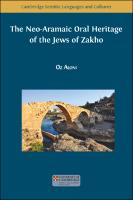The Neo-Aramaic Oral Heritage of the Jews of Zakho
Author(s)
Aloni, Oz
Collection
ScholarLedLanguage
EnglishAbstract
In 1951, the secluded Neo-Aramaic-speaking Jewish community of Zakho migrated collectively to Israel. It carried with it its unique language, culture and customs, many of which bore resemblance to those found in classical rabbinic literature. Like others in Kurdistan, for example, the Jews of Zakho retained a vibrant tradition of creating and performing songs based on embellishing biblical stories with Aggadic traditions.
Despite the recent growth of scholarly interest into Neo-Aramaic communities, however, studies have to this point almost exclusively focused on the linguistic analysis of their critically endangered dialects and little attention has been paid to the sociological, historical and literary analysis of the cultural output of the diverse and isolated Neo-Aramaic communities of Kurdistan. In this innovative book, Oz Aloni seeks to redress this balance.
Aloni focuses on three genres of the Zakho community’s oral heritage: the proverb, the enriched biblical narrative and the folktale. Each chapter draws on the authors’ own fieldwork among members of the Zakho community now living in Jerusalem. He examines the proverb in its performative context, the rewritten biblical epic narrative of Ruth, Naomi and King David, and a folktale with the unusual theme of magical gender transformation. Insightfully breaking down these examples with analysis drawn from a variety of conceptual fields, Aloni succeeds in his mission to put the speakers of the language and their culture on equal footing with their speech.
Keywords
folktale;narrative;Neo-Aramaic;oral heritage;proverb;ZakhoDOI
10.11647/obp.0272ISBN
9781800643024, 9781800643031, 9781800643048Publisher
Open Book PublishersPublisher website
https://www.openbookpublishers.com/Publication date and place
Cambridge, 2022Grantor
Series
Semitic Languages and Cultures, 12Classification
Historical and comparative linguistics
Translation and interpretation


 Download
Download Web Shop
Web Shop